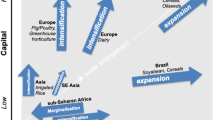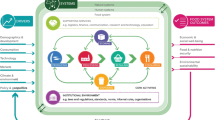Abstract
This Symposium provides an important opportunity to reflect on the current state of scholarship positioning alternative foods against mainstream agri-food systems. Symposia of this kind have a long tradition as marking particular turning points in agrifood debates. This collection provides an opportunity to examine the current positioning of scholarship around the theoretical and methodological fracture line between successor theories to classical political economy and more post-structuralist approaches to alternative economic activities around food and agriculture. In the current collection, despite clear evidence of theoretical positioning around the structural: post-structural divide, I argue that both aspects of agri-food theorizing share similar political intent and are positioned within the same wider political project of agrifood critique. Therefore, despite theoretical fracture, there is a unity of political intention that continues to bind together this particular field of research and practice.
Similar content being viewed by others
Notes
In contrast, the recent collection by Stock et al. (2015) on Food Utopias is a refreshingly open engagement with our need to be more explicit about our political and values projects as scholars.
Abbreviations
- AFRN:
-
Agri-Food Research Network
- ANT:
-
Actor Network Theory
- CSA:
-
Commodity Systems Approach
- FRT:
-
Food Regime Theory
- GMOs:
-
Genetically Modified Organisms
- WTO:
-
World trade Organization
References
Buck, D., C. Getz, and J. Guthman. 1997. From farm to table: The organic vegetable commodity chain of Northern California. Sociologia Ruralis 37(1): 3–20.
Burch, D., R.E. Rickson, and G. Lawrence. 1996. Globalization and agri-food restructuring: perspectives from the Australasia region. Avebury: Ashgate Publishing Ltd.
Burch, D., J. Goss, and G. Lawrence. 1999a. Restructuring global and regional agricultures: Transformations in Australasian agri-food economies and spaces. Avebury: Ashgate Publishing Ltd.
Burch, D., J. Goss, G. Lawrence, and R.E. Rickson. 1999b. The global restructuring of food and agriculture: Contingencies and parallels in Australia and New Zealand. Rural Sociology 64(2): 179–185.
Busch, L. 2000. The moral economy of grades and standards. Journal of Rural Studies 16(3): 273–283.
Busch, L., and A. Juska. 1997. Beyond political economy: Actor networks and the globalization of agriculture. Review of International PoIiticaI Economy 4(4): 688–708.
Buttel, F.H., and H. Newby. 1980. The rural sociology of the advanced societies: Critical perspectives. Montclair: Allanheld, Osmun & Co., Publishers Inc.
Campbell, H., and J. Dixon. 2009. Introduction to the special symposium: Reflecting on twenty years of the food regimes approach in agri-food studies. Agriculture and Human Values 26(4): 261–265.
Campbell, H., C. Rosin, S. Norton, P. Carey, J. Benge, and H. Moller. 2009. Examining the mythologies of organics: Moving beyond the organic/conventional binary. In Food security, nutrition and sustainability, ed. G. Lawrence, K. Lyons, and T. Wallington, 238–251. London: Earthscan.
Campbell, H., and C. Rosin. 2011. After the ‘organic industrial complex’: An ontological expedition through commercial organic agriculture in New Zealand. Journal of Rural Studies 27(4): 350–361.
Carolan, M. 2013a. Putting the ‘alter’ in alternative food futures. New Zealand Sociology 28(4): 145–150.
Carolan, M. 2013b. The wild side of agro-food studies: On co-experimentation, politics, change, and hope. Sociologia Ruralis 53(4): 413–431.
Carolan, M. 2014. Affective sustainable landscapes and care ecologies: Getting a real feel for alternative food communities. Sustainability Science 10(2): 317–329.
Carolan, M. 2016. Adventurous food futures: knowing about alternatives is not enough, we need to feel them. Agriculture and Human Values, this issue.
Clendenning, J., W. Dressler, and C. Richards. 2016. Food justice or food sovereignty? Understanding the rise of urban food movements in the USA. Agriculture and Human Values, this issue.
Constance, D.H. 2008. The emancipatory question: The next step in the sociology of agrifood systems? Agriculture and Human Values 25(2): 151–155.
Crutzen, P.J. 2002. The “anthropocene”. Journal de Physique IV (Proceedings) 12(10): 1–5.
Dixon, J. 2002. The changing chicken: Chooks, cooks and culinary culture. Sydney, NSW: UNSW Press.
Dixon, J. and C. Richards. 2016. On Food Security and Alternative Food Networks: Understanding and performing food security in the context of urban bias. Agriculture and Human Values, this issue.
Dwiartama, A. and C. Piatti. 2016. Assembling local, assembling food security. Agriculture and Human Values, this issue.
Fagan, R.H., and R.B. Le Heron. 1994. Reinterpreting the geography of accumulation: The global shift and local restructuring. Environment and Planning D 12: 265.
Fagan, R.H., and M.J. Webber. 1994. Global restructuring: The Australian experience. Melbourne: Oxford University Press.
Friedland, W.H. 1984. Commodity systems analysis: An approach to the sociology of agriculture. In Research in rural sociology and development, ed. H.K. Schwarzweller, 221–235. Greenwich, Connecticut: JAI Press.
Friedmann, H., and P. McMichael. 1989. Agriculture and the state system: The rise and decline of national agricultures, 1870 to the present. Sociologia Ruralis 29(2): 93–117.
Gibson-Graham, J.K. 1996. The end of capitalism (as we knew it): A feminist critique of political economy. Minneapolis, Minnesota: U of Minnesota Press.
Gibson-Graham, J.K. 2006. The end of capitalism (as we knew it): A feminist critique of political economy—with a new introduction. Minneapolis, Minnesota: U of Minnesota Press.
Goodman, D. 2001. Ontology matters: The relational materiality of nature and agro-food studies. Sociologia Ruralis 41(2): 182–200.
Goodman, D., and M. Watts (eds.). 1997. Globalising food: Agrarian questions and global restructuring. London: Routledge.
Goss, J., D. Burch, and R.W. Rickson. 2000. Agri-food restructuring and third world transnationals: Thailand, the CP Group and the global shrimp industry. World Development 28(3): 513–530.
Guthman, J.H. 2000. Agrarian dreams?: The paradox of organic farming in California. Berkeley, CA: University of California Press.
Guthman, J. 2004. The trouble with ‘organic lite’in California: A rejoinder to the ‘conventionalisation’debate. Sociologia Ruralis 44(3): 301–316.
Hill, A. 2014. Moving from “matters of fact” to “matters of concern” in order to grow economic food futures in the Anthropocene. Agriculture and Human Values. doi 10.1007/s10460-014-9576-5. Published online 25 Dec 2014.
Holt, G., and M. Reed (eds.). 2006. Sociological perspectives of organic agriculture: From pioneer to policy. Wallingford, Oxford: CABI.
Larner, W. 2011. C-change? Geographies of crisis. Dialogues in Human Geography 1(3): 319–335.
Larner, W., and R. Le Heron. 2002. From economic globalisation to globalising economic processes: Towards post-structural political economies. Geoforum 33(4): 415–419.
Lawrence, G. 1987. Capitalism and the countryside: The rural crisis in Australia. Sydney, NSW: Pluto Press.
Le Heron, R. 1988. State, economy and crisis in New Zealand in the 1980s: Implications for land-based production of a new mode of regulation. Applied Geography 8(4): 273–290.
Le Heron, R. 1989. A political economy perspective on the expansion of New Zealand livestock farming, 1960–1984—Part I. Agricultural policy. Journal of Rural Studies 5(1): 17–32.
Le Heron, R. 1993. Globalized agriculture: Political choice. Oxford: Pergamon Press.
Le Heron, R. 2003. Creating food futures: Reflections on food governance issues in New Zealand’s agri-food sector. Journal of Rural Studies 19(1): 111–125.
Le Heron, R., and E. Pawson. 1996. Changing places: New Zealand in the nineties. Auckland, NZ: Longman Paul.
Le Heron, R., and N. Lewis. 2009. Theorising food regimes: Intervention as politics. Agriculture and Human Values 26(4): 345–349.
Lockie, S., and L. Bourke (eds.). 2001. Rurality bites: The social and environmental transformation of rural Australia. Sydney, NSW: Pluto Press.
McMichael, P. 1979. The genesis of settler capitalism in Australia. Intervention 13: 39–78.
McMichael, P. 2009. A food regime genealogy. The Journal of Peasant Studies 36(1): 139–169.
Michelsen, J. ed. 2001. Politics, ideology and practice of organic farming. Special Issue of Sociologia Ruralis 41(1): 3–161.
Milani, L.E. and V. Russo. 2016. Re-localizing ‘legal’ food: a social psychology perspective on community resilience, individual empowerment and citizen adaptations in food consumption in Southern Italy. Agriculture and Human Values, this issue.
Piatti, C. and A. Dwiartama. 2016. From food security to the enactment of change: introduction to the symposium. Agriculture and Human Values, this issue.
Pollan, M. 2001. Behind the organic industrial complex. New York Times Magazine. http://www.nytimes.com/2001/05/13/magazine/13ORGANIC.html. Accessed 1 Feb 2011.
Pollan, M. 2006. The omnivore’s dilemma: A natural history of four meals. London: Bloomsbury.
Pollan, M. 2008. In defense of food: An eater’s manifesto. Camberwell: Penguin Books.
Pomeroy, A. 1986. A sociological analysis of structural change in pastoral farming in New Zealand. Unpublished PhD dissertation, University of Essex.
Pritchard, B., and D. Burch. 2003. Agri-food globalization in perspective: International restructuring in the processing tomato industry. Avebury: Ashgate Publishing Ltd.
Rosin, C. 2008. The conventions of agri-environmental practice in New Zealand: Farmers, retail driven audit schemes and a new spirit of farming. GeoJournal 73(1): 45–54.
Rosin, C., and H. Campbell. 2009. Beyond bifurcation: Examining the conventions of organic agriculture in New Zealand. Journal of Rural Studies 25(1): 35–47.
Rosin, C., P. Stock, and H. Campbell (eds.). 2013. Food systems failure: The global food crisis and the future of agriculture. London: Routledge.
Steffen, W., P.J. Crutzen, and J.R. McNeill. 2007. The Anthropocene: Are humans now overwhelming the great forces of nature? AMBIO: A Journal of the Human Environment 36(8): 614–621.
Stock, P.V., M. Carolan, and C. Rosin (eds.). 2015. Food utopias: Reimagining citizenship, ethics and community. London: Routledge.
Wald, N. and D.P. Hill. 2016. ‘Rescaling’ alternative food systems: From food security to food sovereignty. Agriculture and Human Values, this issue.
Wilkinson, J. 1997. A new paradigm for economic analysis? Recent convergences in French social science and an exploration of the convention theory approach with a consideration of its application to the analysis of the agrofood system. International Journal of Human Resource Management 26(3): 335–339.
Williams, R. 1975. The country and the city. Oxford: Oxford University Press.
Wolf, S., and A. Bonanno (eds.). 2014. The neoliberal regime in the agri-food sector: Crisis, resilience and restructuring. London: Routledge.
Wright, E.O. 2010. Envisioning real utopias. London: Verso.
Author information
Authors and Affiliations
Corresponding author
Rights and permissions
About this article
Cite this article
Campbell, H. In the long run, will we be fed?. Agric Hum Values 33, 215–223 (2016). https://doi.org/10.1007/s10460-015-9639-2
Accepted:
Published:
Issue Date:
DOI: https://doi.org/10.1007/s10460-015-9639-2




